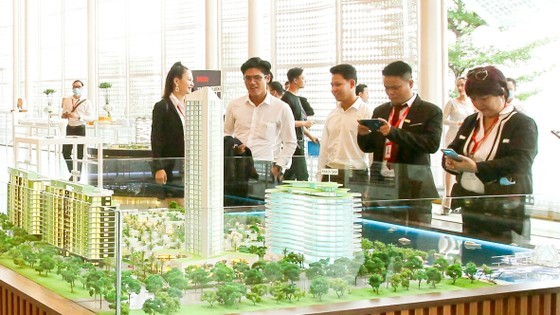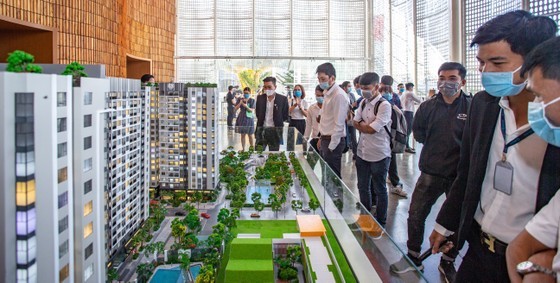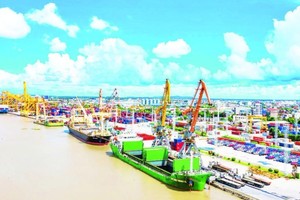 |
Customers view a model of a housing project in Thu Duc City, Ho Chi Minh City. |
Apartments see recovery
Last September, the high-rise condominium project Masteri Centre Point, situated in Thu Duc City (HCMC), garnered many prospective buyers during its sales launch. The project's developer introduced attractive policies, including bank partnerships that allowed homebuyers to finance 70 percent of the apartment's value with a 0 percent interest rate for the first two years, a seven-year installment plan, and the commitment to deliver homes within 2-3 years from the initial deposit, even with just a 20-40 percent down payment. Thanks to these incentives, within just a few days after the sales launch, nearly 2,000 individuals reserved apartments.
Le Kim Dung, residing in Hiep Binh Phuoc Ward, Thu Duc City, is searching for a two-bedroom apartment. She mentioned that she got married six years ago and has a child currently attending preschool. Around two years ago, real estate prices in HCMC were consistently on the rise, and the interest rates for bank loans were high, making it unfeasible for her and her husband to purchase a house. However, in recent times, several property developers have introduced apartments for sale with various attractive policies, and the interest rates for home loans from many banks have gradually decreased. Consequently, Ms. Le Kim Dung and her husband have decided to opt for a purchase.
"My husband and I have been saving around VND1.5 billion, and we are considering buying an apartment priced at approximately VND2.5 billion. I have noticed that bank interest rates have become lower than before, so we are weighing our payment options to purchase the apartment before the 2024 Lunar New Year," shared Kim Dung.
The Q3-2023 real estate market report from Savills Vietnam Real Estate Services Group highlights significant positive developments in HCMC's apartment market. Specifically, the number of new apartments surged by 572 percent on a quarterly basis (in comparison to Q2-2023) and increased by 11 percent year-on-year (compared to 2022), totaling 2,528 units.
Apartment projects in Thu Duc City captured a dominant 74 percent of the market share, while additional sources of supply included Grade B (mid-range apartments) and Grade C (affordable apartments) projects in Binh Tan and Binh Chanh districts. Simultaneously, the primary supply (apartments sold directly by developers) increased by 32 percent on a quarterly basis (compared to Q2-2023) and 12 percent year-on-year (compared to 2022), reaching a total of 7,722 units, thus partially easing the pressure of supply shortages. During Q3, the transaction volume reached 2,003 units, marking a remarkable 561 percent quarterly increase and a substantial 102 percent annual increase.
According to economic expert Tran Nguyen Dan, a lecturer at the HCMC University of Economics, the real estate market only flourishes when housing prices decrease, and bank lending activities become more accessible. If either of these conditions is lacking, the real estate market will find it difficult to defrost. Therefore, the State Bank of Vietnam should provide guidance to banks in their home loan lending activities to help them avoid legal risks and hesitations in lending. Currently, banks are willing to lend but fear violating regulations, resulting in bad debts. They seek more specific guidance to navigate these challenges.
Having closely monitored the real estate market recently, Mr. Vo Hong Thang, Director of Consulting Services and Project Development at DKRA Group, has observed that in Q3-2023, the data indicates positive developments in HCMC's real estate market, showing a gradual path towards recovery. However, he emphasized that the market needs more time to transition to the next phase. Segments catering to practical housing needs are anticipated to recover more effectively than speculative ones. For instance, segments offering apartments at prices aligned with the financial capabilities and preferences of residents in both the central areas of HCMC and its outskirts are likely to experience a robust recovery.
Enterprises must take initiative in restructuring
In his assessment of the current real estate market in HCMC, Dr. Tran Du Lich, Member of the National Monetary Policy Advisory Council, notes that the real estate market is recovering slowly. While the overall Vietnamese economy is steadily improving month by month and quarter by quarter, achieving significant growth in 2023 remains a challenge. In this context, the real estate sector faces additional difficulties due to its close ties with the financial and credit markets.
 |
Customers at the launch event of a housing project in Thanh Xuan Ward, District 12, HCMC |
Dr. Tran Du Lich identifies two key bottlenecks in the real estate market, namely institutional and capital absorption issues. Among these, the capital absorption bottleneck is considered the most significant. Starting from Q4-2022, the real estate market encountered challenges related to a shortage of capital and high interest rates. Currently, interest rates have begun to decrease, and various institutional policies are being implemented to address these issues. It is anticipated that the real estate market will witness positive developments from the present time through the end of the year and into 2024.
Dr. Tran Du Lich further emphasized that the real estate market may not experience a collapse, but it faces significant challenges in returning to favorable conditions like before 2019. The market might transition from a somewhat negative state to a slightly positive one in the fourth quarter of this year, with more substantial improvements anticipated starting in the second quarter of 2024. However, achieving these outcomes requires addressing the supply and demand issue in the real estate market because speculative products dominate, while those tailored to genuine needs remain scarce.
Meanwhile, Mr. Tran Hoang Quan, Director of the Department of Construction of HCMC, said that the real estate business in the city encountered several difficulties during the first nine months of 2023. However, there have been gradual signs of recovery in terms of growth rates and revenue. Additionally, the supply of commercial housing has increased compared to the same period last year. Nonetheless, domestic and foreign investments in real estate activities still remain limited, and there is a scarcity of affordable housing products in the market. Mr. Tran Hoang Quan said that the city had implemented a variety of decisive measures, with a focus on addressing business challenges to foster secure, healthy, and sustainable development of the real estate market.
However, according to Mr. Tran Hoang Quan, entrepreneurs and real estate enterprises must proactively reorganize their operations, streamline their structures, embrace information technology, digitize, and leverage artificial intelligence to lower operational expenses. They should also enhance their collaborations and partnerships with other businesses and reconfigure their real estate offerings to better match genuine market demand, with a particular emphasis on developing affordable and low-cost housing segments. A crucial step is to reassess pricing, timelines, and payment methods, ensuring they are practical, viable, and customer-friendly, especially for those with authentic housing needs.
1,019 households in 20 old apartment buildings agree to relocate
According to the HCMC Department of Construction, the city has successfully relocated 1,019 households residing in 20 old apartment buildings. Notably, for the 16 buildings categorized as level D (high-risk), 673 households have been relocated. Meanwhile, for other old apartment buildings, the city has completed the relocation of 346 households.
The city has completely demolished ten apartment buildings, consisting of four level-D structures and six old apartment complexes. However, there have been no level D apartment projects initiated for new construction.
In Decision No.3837/QD-UBND, HCMC set the goal of renovating and repairing 246 Grade B and C apartment buildings (comprising 66 Grade C and 180 Grade B) by 2025, with an estimated budget of VND500 billion from the State budget. However, as of now, no apartment buildings have undergone renovation or repair due to the absence of budget allocation.
























